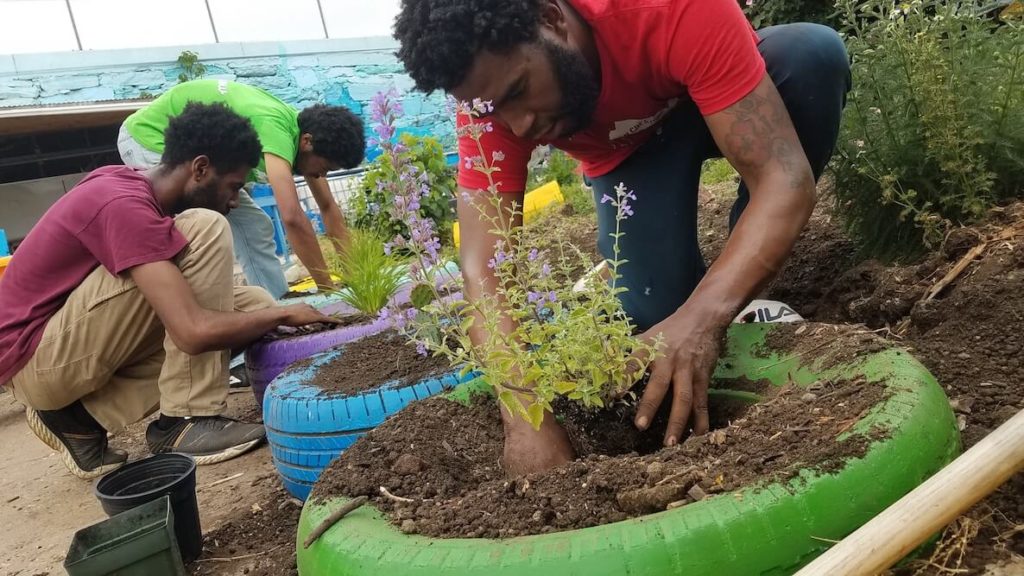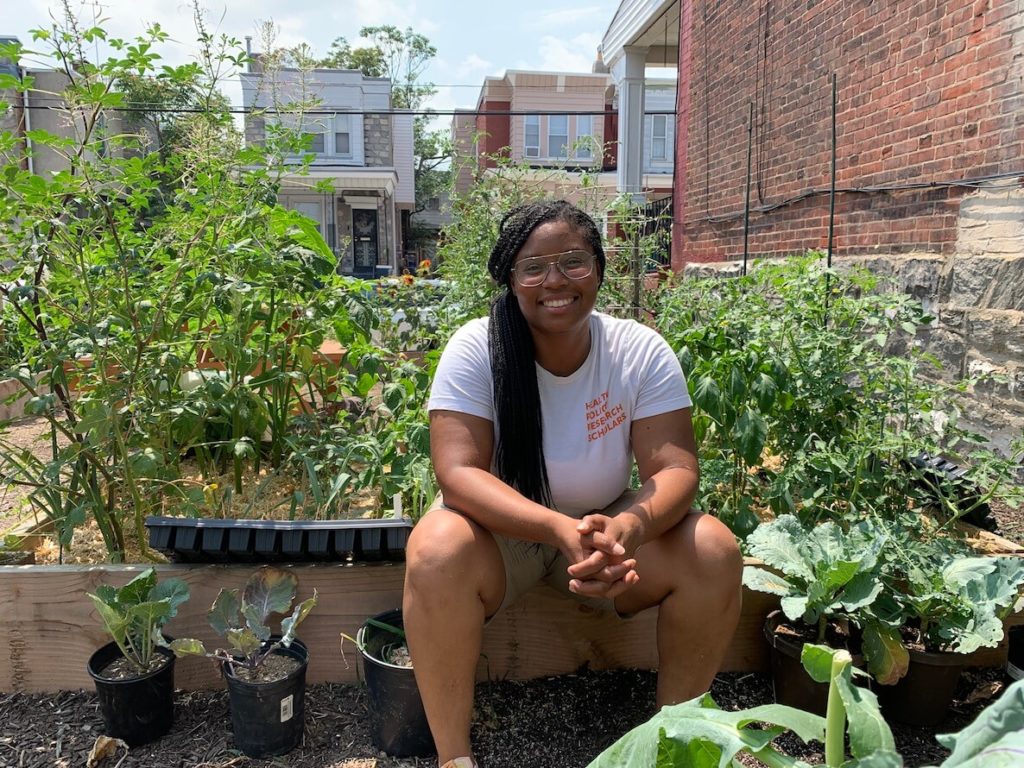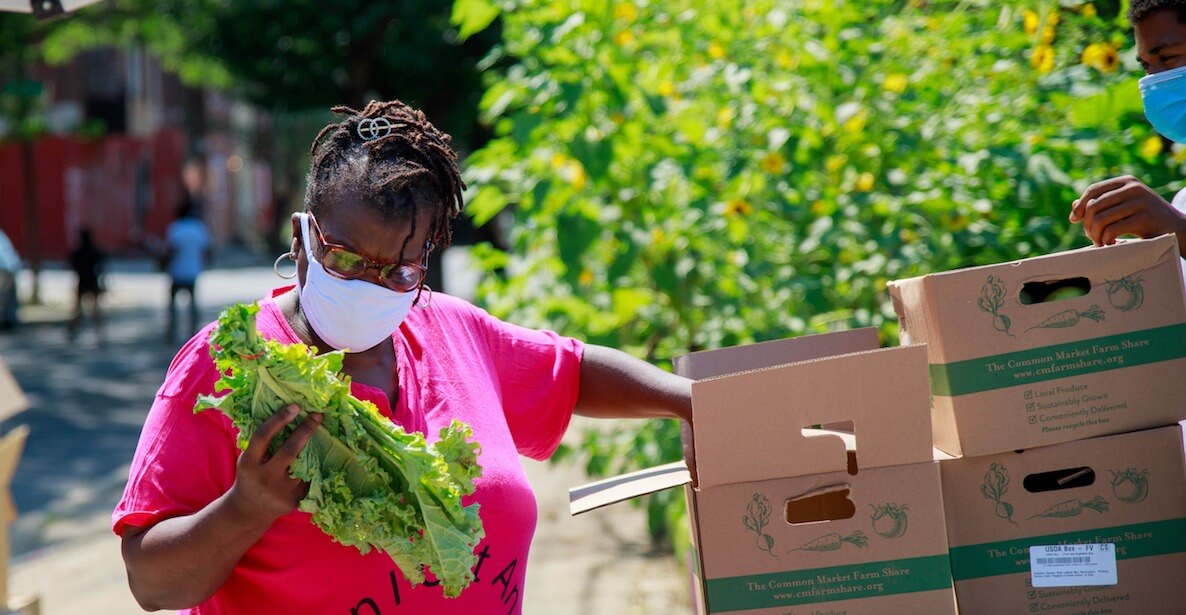In tackling any seemingly intractable problem, there’s never a magic bullet.
Progress is made through concerted effort by many groups coming at the issue in different ways. Diverse perspectives equals diverse solutions—necessary for making headway on complex issues.
That’s what the Division of Chronic Disease and Injury Prevention at the Philadelphia Health Department—also known as Get Healthy Philly—recognized several years ago. And it led them to try a new approach in their work towards food justice—which they define as everyone having the right to grow, sell, prepare and eat food that’s nourishing for themselves and their community.
Rather than dedicating all their funds into more broad-based “Get Healthy” initiatives, they decided to try putting the power—and money—in the people’s hands.
MORE ON FOOD JUSTICE INITIATIVES IN PHILADELPHIA
“We are increasingly recognizing that nutrition is tied up in a lot of different things,” says Amanda Wagner, who manages Get Healthy Philly’s nutrition and physical activity work. “[We’re] thinking about how we should really be following the lead of various Philadelphians, and shifting from just having one citywide approach to healthy food access.”
So in 2019, the Health Department teamed up with the Reinvestment Fund to launch the Philadelphia Food Justice Initiative (PFJI). Initially with Health Department dollars and now with funding from both institutions, PFJI supports community-led—meaning designed, implemented and owned by folks in the community the project seeks to serve—work that gets healthier food to Philadelphians who have the least access to it.
Which is actually not so simple a task. Providing “access to healthy foods” brings up questions like, “What are people’s connections to food? What food do they have available to them?” Wagner says. “What do they see as opportunities and solutions?”
Turns out Philadelphians have a lot of ideas; PFJI received more than 100 applications for the first round of funding. And in the past two years, PFJI awarded more than $640,000 to 12 organizations—10 of which are BIPOC-owned or led. The money has funded Urban Creators’ mobile pop-up food markets; Rebel Ventures’ in-school market selling healthy snacks made by Philly youth; Land Based Jawns’ workshops for Black and Indigenous women to learn to grow food and live off the land—and a whole lot more.

On August 3, they announced their third call for proposals—offering $380,000 in grants for community-driven solutions to historic food injustice. As in past rounds, projects led by Black, Indigenous and people of color and/or people with lived experience with health injustice will be prioritized, says Reinvestment Fund’s Molly Hartman.
“This initiative is really about supporting the grassroots of transforming our food system,” Hartman says.
The stakes of health disparity
A closer look at Philadelphians’ access to healthy food reveals a pretty grim reality. According to a 2019 Philadelphia Health Department study, 81 percent of all stores that sell food in the city offer mostly unhealthy food—they carry lots of processed items high in salt, sugar and fat and little fresh produce.
And poorer Philadelphians have significantly fewer stores selling healthy food in their neighborhoods. In the lowest median income parts of the city, stores that sell little to no fresh produce outnumber stores that sell a lot by nearly seven to one. In the highest median income parts of the city, the ratio is just 1.5 to 1. The vast majority of Philadelphians living in poverty are people of color; poverty rates for Latinx, Black and white Philadelphians are 37.9, 30.8 and 14.8 percent respectively.
And the stakes of those disparities, referred to by some as food apartheid—coupled with raging inequity in health care—can be quite literally life or death. Heart disease—more frequently developed in people who have a diet high in fat, salt, sugar and cholesterol—is the leading cause of death here in Philly (as it is nationally), with 3,417 dying of it in 2019. Black Philadelphians are 1.3 times more likely to die of heart disease than white Philadelphians.
 And we’re smack in the middle of another massive reminder of the consequences of health disparities. Of the 10,126 (reported) Philadelphians who have been hospitalized due to Covid-19, half are Black and just 20 percent white (those groups each make up a little more than 40 percent of our city’s population). Nationally, adjusted for age, Black Americans have been 2.8 times more likely to be hospitalized and two times more likely to die of Covid-19 than white Americans—in part due to the prevalence of comorbidity, as well as lack of access to quality health care.
And we’re smack in the middle of another massive reminder of the consequences of health disparities. Of the 10,126 (reported) Philadelphians who have been hospitalized due to Covid-19, half are Black and just 20 percent white (those groups each make up a little more than 40 percent of our city’s population). Nationally, adjusted for age, Black Americans have been 2.8 times more likely to be hospitalized and two times more likely to die of Covid-19 than white Americans—in part due to the prevalence of comorbidity, as well as lack of access to quality health care.
To lessen these disparities, Get Healthy Philly is focusing on health justice, which they define as, “The collective movement to heal society and eliminate barriers that prevent individual and community well-being.”
“[Health justice] is really this recognition that individual health is tied up in community health,” says Wagner. “And community health didn’t just appear out of nowhere.”
Meaning, there are systems, structures and policies in place that are responsible for our huge health disparities—including systemic racism, which has prevented people of color owning land, accumulating wealth, and in turn accessing quality healthcare and nutritious food—literally the building blocks of good health.
“Food is such a key part of that because food has such a connection to your physical health, your mental health, your community’s health,” Wagner says. “And it also can connect with celebration and joy and culture and history.”
Land Based Jawns
On a recent stifling day, Ashley Gripper knelt next to a raised bed in an empty lot-turned-garden oasis in Cobbs Creek. Behind her, cucumbers hung along a wood trellis and just-ripening cherry tomatoes peeked through foliage drooping in the midday heat. “This will help keep the moisture in the soil,” Gripper said as she spread golden straw around the base of sage and holy basil plants.

It’s a page in the vast catalog of food-growing wisdom Gripper has shared over the past year. In 2020, with a $57,000 grant from PFJI, the Philly-native launched Land Based Jawns to offer Black, brown and Indigenous women agriculture, survival, self-defense and carpentry education and training, and self and community healing.
The first cohort of 17 women participated in 10 workshops earlier this spring. They learned to start seeds and build raised beds with Chef Laquanda Dobson and Hajjah Glover at Sankofa Community Farm at Bartram’s Garden—but it wasn’t just about food. Gripper brought in Nyambi Naturals to teach the women to make medicinal salve, and therapist Tien Sydnor-Campbell to guide radical self-forgiveness and provide tools for healing. Gripper created short video lessons to share with her 2,000-plus followers on Instagram as well.
Gripper’s Earthseed Skillshare series was inspired by the Parable books written by Octavia Butler in the ’90s. The prescient Parable of the Sower and Parable of the Talents are set in California, mid-2020s. The central characters are trying to survive amid rampant violence and scarcity caused by climate change, social inequity and other problems we ignored in the previous century. The teenage protagonist sets out to live differently, and inspires others to join the community she starts to build.
“[Butler] provided a road map of not only how we survive,” Gripper says. “But also how we heal, how we thrive, and then how we rebuild.”
Gripper has worked in food justice for 10 years, since her first job out of college at Penn’s Urban Nutrition Initiative. She’s currently a PhD Candidate in Environmental Health at the Harvard T.H. Chan School of Public Health, where she’s exploring the impacts of urban agriculture on the mental, spiritual, and social well-being of Black people.
Early in 2020, her father, Paul Gripper III, died of heart disease. It was nine years after her mom passed. Gripper attributes her sickness to the grief she experienced after her maternal grandfather died.
Gripper’s friends—many who are farmers—urged her to work the land. She became an apprentice at Sankofa and actually experienced for herself what she was writing about in her dissertation. “When my dad passed, it gave me the opportunity to stop doing school, stop pushing and really slow down and lean into doing the things that I’ve always wanted to do.”
“The activities that Ashley had us go through—pitching a tent, building raised beds, radical self-love—the key factor is yourself,” Moody says. “Of course you gotta do this stuff in community, but everyone has to understand how much power they have and how they can really change not only their lives but other people’s lives.”
It also gave her time to reflect and process what had happened in her family. “Daddy experienced food apartheid; Mommy was grieving deeply, didn’t have the tools or resources to work through it; Daddy was grieving mommy, definitely didn’t have the tools or resources to work through it,” she says. “I have the tools and resources to work through it and I see the differences it’s making in my life. But how many other people are in that same situation?”
Mieka Moody, award-winning branch manager and library supervisor at the Lillian Marrero Library, joined the first cohort this spring—and is one of the few women who made it to every single workshop. “Everything I went to hyped me up, empowered me,” she says.
She plans to share some of what she learned through the library community and would like to bring Gripper in for programming as well. Even more profoundly though, she started getting more in touch with herself, she says.
“The activities that Ashley had us go through—pitching a tent, building raised beds, radical self-love—the key factor is yourself,” Moody says. “Of course you gotta do this stuff in community, but everyone has to understand how much power they have and how they can really change not only their lives but other people’s lives.”
Call for proposals
Other PFJI grantees include Glover Gardens, which used funds to design, build and install garden beds in Southwest, West, North, and Northeast Philadelphia homes. Mill Creek Farm hired three Black women to manage the farm and donated hundreds of pounds of produce to pop-up food drives around West Philadelphia during the height of the pandemic. Asociación Puertorriqueños en Marcha developed a plan to launch a community-owned affordable produce buying club.
All projects provide a final report, which also serves as a reflection on opportunities, challenges and feedback for the program.
This year, individuals and groups can apply for up to $100,000 in funding for whatever they need—operating overhead; staffing; planning and research; working with a consultant; supplies or inventory; pandemic recovery, for example—to further work focused on increasing access to healthy food in neighborhoods that have historically lacked access. The proposed project must have either deep-roots in a neighborhood or (defined) community; broad city-wide reach; or potential for systems change or scaling up over time.
“It’s not just about what’s lacking—it’s, what’s there that people are connecting with?” Wagner says. “What gives them joy and how do we build on that as well?”
The application process is designed with grassroots organizations in mind. There’s flexibility—applicants can use photos and videos to help describe their work, and the review team makes themselves accessible for questions along the way. This year, they’re also hosting a (virtual) info session—August 18 at 2pm—where folks can ask questions. It will be recorded and widely shared.
“We know that accessing funding is a big barrier for a lot of organizations so we’re looking for ways to connect more and give them the tools that they need hopefully to provide a strong application,” says Hartman. Also new this year: they’re accepting applications in Spanish. (Applications are due September 20.) Applications will be reviewed by a diverse selection committee including members of various city departments, food-focused organizations and folks who have direct experience with food insecurity.
Though this work tends to highlight the injustice, Wagner says that the initiative is about supporting the energy and solutions that are already there as well. “It’s not just about what’s lacking—it’s, what’s there that people are connecting with? What gives them joy and how do we build on that as well?”
The Citizen is one of 20 news organizations producing Broke in Philly, a collaborative reporting project on solutions to poverty and the city’s push towards economic mobility. Follow the project on Twitter @BrokeInPhilly.
RELATED READS
Guest Commentary: Solve “The Lost Mile” for Hungry Philadelphians
Header photo: Urban Creators held pop-up food drives throughout the pandemic with PFJI funds | Courtesy of The Philadelphia Food Justice Initiative




